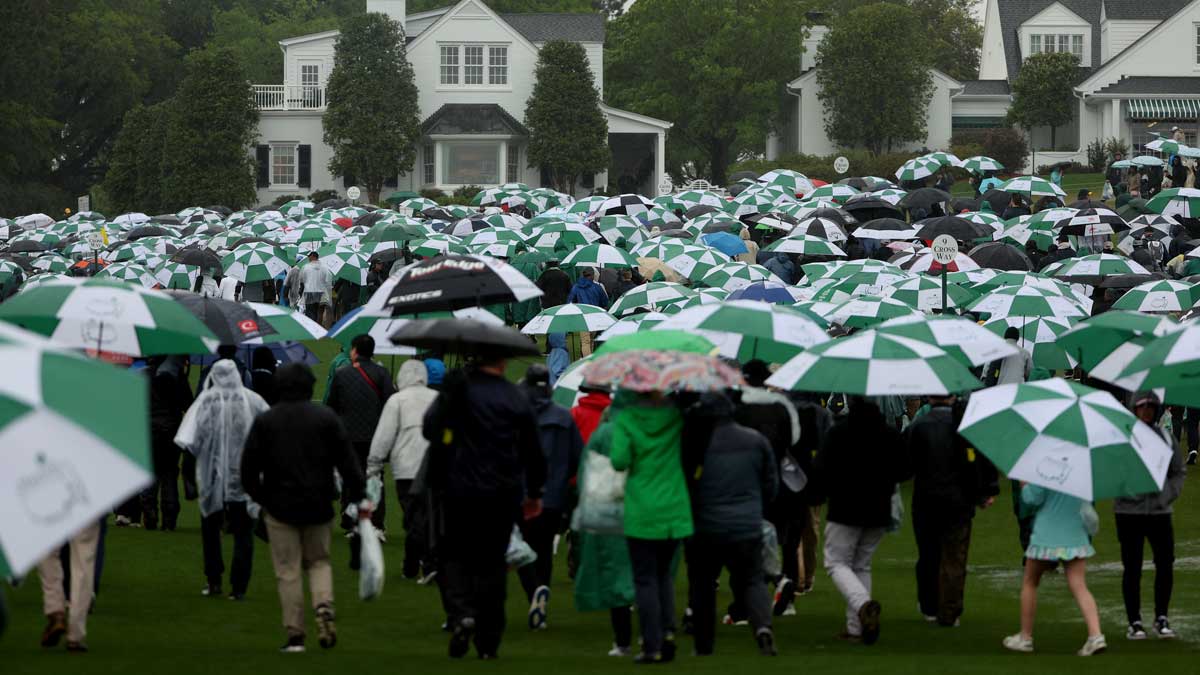AUGUSTA, Ga. — As a steady rain hammered Augusta National on Saturday afternoon, Roxanne Jump was taking in the 87th Masters from a folding chair behind the green at the par-5 2nd. She’d been there all day. Beside her in another fold-up was her daughter, Karen Fiery, both from Williamston, S.C., a two-hour drive north of Augusta.
“This is my first Masters,” Roxanne said, peering out from beneath a green-and-white Masters umbrella. “I’ve been on the waiting list [for a badge] for 23 years, and I finally got one. I’m excited as heck. I wouldn’t miss this.”
Karen — soaked and shivering — exuded a decidedly different vibe.
“I’m a little miserable,” she said.
Such was the mixed-bag vibe around the property in the third round — well, for what part of the third round they got in, anyway; when play was called at 3:15 p.m. local time, the leaders were only on the 7th hole.
Patrons were, as ever, (mostly) happy to be here. But given the relentless rain, dank air and barely-50-degree temperatures, the weather was better suited for crab-fishing than golf-watching. Streams of water crisscrossed the sloping terrain. Armies of umbrellas lined the fairways. Poncho-wearing patrons tried to warm their chilled bones over Sub-Air grates. Behind the 9th green, the viewing area was so sloppy it looked like a scene from Woodstock. On the 1st fairway crosswalk, a patron slipped on the wet grass and toppled to the ground like a downed loblolly.
Shortly before the horn blew, ceasing play for the day, two grounds-crew workers pushed water off the 7th green with squeegees as Brooks Koepka, Jon Rahm and Sam Bennett looked on. They were something akin to sailors fruitlessly trying to save a sinking ship with only a couple of pails.
“I understand they’re trying to push us to play as many holes as possible,” Rahm said. “But it was very apparent when they tried to get the water out that it just wasn’t going to happen in our case.”
The brutal conditions weren’t just a struggle for patrons and workers, of course. The wind and wet also beat down the players. There was some question as to whether officials should have suspended play sooner.
“Honestly could have called it about 45 minutes earlier,” Bennett said. “But they tried their best.”
Rahm said he understood the reluctance to sound the horn until it was absolutely necessary, adding, “You can’t really say it was late because I don’t blame them for wanting us to play as much as possible.”
Rahm, Koepka and Bennett now face a marathon 29-hole Sunday.
In such trying conditions, everything gets more difficult: staying stable over the ball, keeping grips dry, judging distances.
“Ball’s not going anywhere,” Koepka said, which was particularly evident on the par-4 18th, which plays straight uphill and, on Saturday, into a strong cold wind. On a hole where the longer players typically hit an 8- or 9-iron into the green, Rahm hit 4-iron — and still came up short. From the left rough, Adam Scott managed to get home but needed a 3-iron to do so — a club he usually carries 240 yards, he said.
“I feel like I just survived,” said Scott, who made four birdies in his first 11 holes before sneaking in a pair of birdies on 12 and 13 to climb back to even par just before play was suspended. “I wasn’t feeling great out there this morning, but I managed some good saves. I didn’t really give myself any chances. It was just hard work.”
Sunday promises more of the same — not in terms of the forecast but in terms of fortitude required.
Rahm, for one, is not concerned.
“When you’re in the position we’re in,” he said, “adrenaline kicks in and it doesn’t really matter.”
